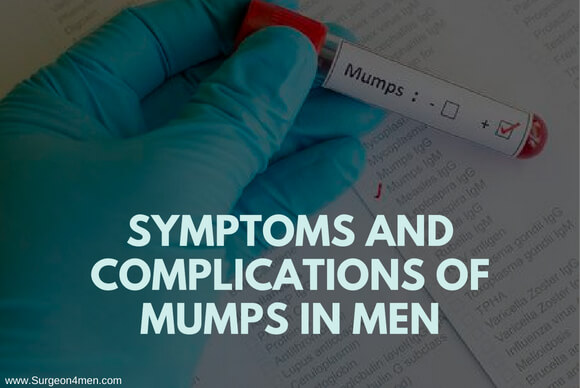Symptoms and Complications of Mumps in Men
Mumps:
Mumps is a contagious viral disease that is caused by mump virus. It can easily be transmitted from one person to the other through coughing, sneezing or close contact with an infected person. The symptoms of virus begin to appear within 12 to 25 days after catching the infection.
The mumps virus often begins at the level of parotid gland which is also called salivary gland as this gland is responsible for the production of saliva. One of the major signs of active mumps infection is having swollen salivary glands. This virus usually affects children and sometimes become complicated even with treatment.
Symptoms of Mumps
Mumps can be mild or severe. Sometimes when the viral infection is mild it doesn’t produce any major symptoms. Depending upon the severity of virus, following symptoms may appear.
- Swollen or painful salivary gland sometimes on just one side of face and sometimes on both sides.
- Tender salivary gland and affected parotid glands.
- Fever, low grade initially that can spike up to 103 degrees.
- Headache.
- Full body and muscle pain.
- Fatigue, weakness and tiredness.
- Loss of appetite.
Causes:
The cause of this infection is mumps virus that can easily be spread from one person to the other via saliva. If you have not been vaccinated or have no immunity against this virus; you can easily catch the disease by contact with an infected person through sneezing or coughing. Even by using the cups or utensils of the infected person.
What are the complications?
There are various long-term complications that may occur due to mumps virus and can lead to serious life-threatening consequences; however, it happens only in rare cases.
- Swollen testicles:
Almost one in four men who suffers from mumps after puberty, develops painful and swollen testicles. This condition of swollen testicles is known as orchitis. The swelling usually occurs in only one testicle. Orchitis also cause tender testicles and feel warm.
- Viral meningitis:
It occurs when virus hit meninges i.e. the outer protecting layer and membranes of brain and spinal cord. It is rare and occurs in around one in 7 cases however, it is life threatening. In this condition the meninges got inflamed and if not treated in time, can becomes severe and deadly.
- Pancreatitis:
The inflammation and short term swelling of pancreas occur 1 in 20 cases of mumps. It is characterized by sudden pain in the middle of your belly, diarrhea, loss of appetite, high temperature etc.
- Loss of hearing:
Hearing loss is rare in mumps and can be permanent or temporary.
- Encephalitis:
This is also a severe and often life-threatening complication of mumps infection in which brain substance become inflamed.
Treatment:
The mumps is virus and cannot be relieved with antibiotics or other medicines. However, by treating and managing the symptoms, you can minimize the risk of complications.
Some ways to get relieved while suffering from mumps virus includes:
- Get adequate amount of sleep and rest.
- Take different pain killers to ease pain and discomfort like Ibuprofen, Acetaminophen.
- Apply ice packs or cold compressors on swollen glands.
- Drink plenty of water and other fluids to avoid dehydration.
- Take liquid or soft diets like soups, yogurts juices, porridge etc. because your glands are swollen and it becomes more painful if you eat hard solid foods that are difficult to chew/swallow.
Prevention and vaccination in adults:
Mumps vaccination is usually given at a young age. The mumps vaccination is usually administered in the form of MMR (measles, mumps and rubella).
It is not essential to get vaccination for mumps especially in following cases.
- You already have good immunity against mumps.
- Already got vaccinated against MMR due to which you are at low risk of getting this virus.
The vaccination of MMR should be avoided if the person is allergic with Neomycin or Gelatin and the people who have cancer or other blood related diseases that reduces their immunity.
Side effects of getting MMR:
There are no major side effects of MMR however; sometimes people may experience allergic reaction or mild fever after vaccination.

